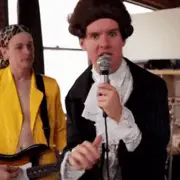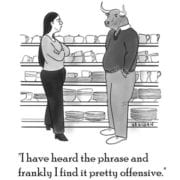Anatomy of a Sketch: Derrick Comedy’s “Thomas Jefferson”
In the mid-2000s, when college sketch group videos were suddenly all over the place, Derrick Comedy easily made the best ones. Derrick was a five-person operation originally out of New York University consisting of director Dan Eckman, producer Meggie McFadden, and primary performers Dominic Dierkes, Donald Glover, and D.C. Pierson, all of whom have variously gone on to act, direct, write for television, and publish books. Collectively, however, they’re best probably best known for their 2009 cult classic feature Mystery Team, but they also made “Thomas Jefferson,” which is, fun fact, the greatest comedy sketch of all time. Really.
I told the members of Derrick just that when they agreed to answer my questions about the making of the sketch, but I think they would have replied anyway.
It’s staggeringly original.
The sketches go to completely unexpected places, and constantly elevate the situation and “yes and” themselves. It makes for a novel product, and “Thomas Jefferson” is that kind of sketch. The plot: A reporter (Glover) from a TV newsmagazine interviews a man that tests have proven to be the real Thomas Jefferson (Pierson), a time-traveler and complete jerk who must endure “infinite revolutions of time until he finds the Critical Inconsistency” and ultimately defeat a “Dark Jefferson” to quiet “the chiming of the Infinity Bell.”
There are lots of surprise turns.
While a sketch about a time-travelling Thomas Jefferson has a lot of potential and would make for a serviceable enough product, this Thomas Jefferson doesn’t want to talk about his supernatural abilities, or even the true intent of the Founding Fathers. He just wants to rock out with the band he discovered, an obviously and egregiously shitty group called the Sail Away Boys (portrayed by L.A. band Hi Ho Silver Oh), led by a yellow-jumpsuited guitarist named Jerry (Dierkes). More turns come in the form of the hilariously cynical reason why Jefferson is so into this band, as well as his seemingly magical ability to give people terrible diseases.
It quickly and smoothly establishes its complex concept.
You don’t need a green-screen and latex costumes to do sci-fi properly. I mean, those things certainly help establish a world and let the audience in on the deal, but the best performative sci-fi can be done with words only. Like how Douglas Adams’ The Hitchhiker’s Guide to the Galaxy originated as a radio play, “Thomas Jefferson” includes an elaborate backstory and a world with its own “rules” – and hints of what’s to come – through some stray lines of dialogue. That is some extremely agile and confident writing. The sketch establishes its conceit quickly, nails some exposition, and gets out of the way so the actors can just start peeling off comedy bits, in much the same way that Thomas Jefferson says Jerry peels off hot licks.
It takes an obnoxious celebrity down a peg.
We as a culture love laughing at comedy people laughing at famous people who don’t know how far up their own asses they are. That notion is at the core of “Thomas Jefferson.” “As I recall, we were all driving from New York to L.A. together and we kind of became obsessed with this radio interview of Billy Bob Thornton where the interviewer wants to ask him about his whole career but Billy Bob only wants to talk about his band,” Eckman said. “We thought it would be funny if someone had like all the answers in the universe but still only wanted to talk about their band.”
It’s so incredibly polished…
Say what you will about the magic of improv and the great comedy that comes out spontaneity and living in a moment, but it’s hard to beat a meticulously crafted sketch with just the right beats and stellar lines made up of the precisely correct words. It took Derrick months to perfect this sketch, and it shows. It’s also in the workshopping phase where actors and writers get to know the material on a deep level, which can generate even more great bits. “After doing the bit together for about a year, I think we all knew how the beats were going to shake out,” Derrick producer Meggie McFadden said. “D.C. wrote up the draft when we decided to shoot it, and came up with the great idea of a ‘dark’ Jefferson and the Infinity Bell, which are my favorite specifics from the sketch.”
…But also loose.
On the other hand, you don’t want a sketch to be so tightly wound and have actors so devoted to delivering the script to the letter that they can’t add in something. “There are some improv’d lines” in the piece, according to Pierson, such as Jerry remarking that Jefferson calls Jerry’s nephew “future Hitler” and Glover’s reporter getting so frustrated with Jefferson that “he walks off, which really bring the adversarial relationship he has with the reporter full circle.” There are just an impressive number of layers to such a short and ridiculous sketch.
The music is hilariously godawful.
The idea that Thomas Jefferson is obsessed with a shitty lite rock can only work if the lite rock band is believably shitty. And the Sail Away Boys are just that shitty. (It took real skill from Pierson and Hi Ho Silver Oh to sound that bad on purpose). “Jefferson is obsessed with Jerry’s ‘hot licks’ because once you’ve experienced all of time, what you value most is the truly mediocre. And Jerry’s ‘hot licks’ are the most mediocre thing the universe has to offer,” says Dierkes about the band’s song, “Twelfth Avenue Train.” (Pierson calls that song “a Dadaist ‘Tenth Avenue Freeze-Out.”)
A good sketch is all about what didn’t go in the sketch
Pierson reminds that a great filmed sketch, particularly one that takes the form of a newsmagazine parody, a genre with its own rules and limitations, is only as good as its editing. Derrick had to cut out a lot of Sail Away Boys performance footage and kill some scripted moments that didn’t quite work, and then cut the thing together into a tight little package. “There was a bit I liked in the script about a physicist running up to write down what Jefferson is saying and he’s annoyed about it and wishes it were someone from Rolling Stone,” Pierson says. “Dan is a very good editor and one of his many strengths is he cuts together a great version of the thing you actually have, not the thing you thought you thought you had.”













